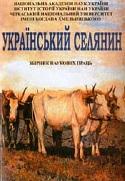Pecularities of Application of Revolutionary Agrarianist Experience in Contemporary Ukraine
Main Article Content
Abstract
Introduction. The experience of the events of the Ukrainian Revolution of 1917-1921 is especially
relevant for modern Ukraine. Modern geopolitical transformations, radical changes in the domestic political life
of Ukraine, ambitious plans of the government are a chance for our state to restore its full-fl edged subjectivity
in the international arena, in the domestic life of the country. An effective mechanism of external and internal
subjectivization of Ukraine, given the longevity of agricultural culture (in a broad sense), can be agrarian policy,
its effective implementation. This implies not only a clear understanding on the part of the state of the essence of
agrarian policy, its purpose, stages and mechanisms of implementation.
The author of the article aims, taking into account the experience of agrarianist transformations of the
Ukrainian Revolution of 1917-1921, to propose a possible ideological model of the latest agrarian transformations,
which should concern the peasant-owner with the optimal amount of land tenure/land use for profi table high-tech
use.
Results. The basic ideology of agrarianist by its content agrarian policy is the creation and effective
functioning of the State Land Bank. At one time, such an institution was the bank «Ukraine». Its main functions
were:
1) valuation of land to be sold;
2) distribution of lands that will be transferred to the bank’s land fund;
3) determination of the maximum and minimum sizes of plots that peasants can buy from a bank, etc.
Conclusion. Thus, the basic principles of Ukrainian agrarianism of the period of the Ukrainian revolution
of 1917 - 1921 are quite suitable for modern agrarian policy. Their implementation in the 21st century will
contribute to the internal subjectivity of Ukraine, the formation of a high-tech national agricultural producer
Article Details

This work is licensed under a Creative Commons Attribution-NonCommercial 4.0 International License.
References
Josef, H. (1981). Materiály k politickým, hospodářským a sociálním dějinám Československa v letech 1918-1929. Praha : Ústav
československých a světových dějin CSAV. [in English]
Kornovenko, S. & Zemziulina, N. (2018). Revoliutsiini potriasinnia pochatku KhKh st.: ahrarne zakonodavstvo krain Tsentralnoi
ta Pivdenno-skhidnoi Yevropy. [Revoliutsiini potriasinnia pochatku KhKh st.: ahrarne zakonodavstvo krain Tsentralnoi ta Pivdennoskhidnoi Yevropy]. Ukrainskyi selianyn, 19, 45 – 49. [in Ukrainian].
Kornovenko, S. (2017). Subiektnyi skladnyk ahrarnoho pytannia yak odna z peredumov Ukrainskoi revoliutsii 1917–1921 rr.
[Subjective component of the agrarian question as one of the preconditions of the Ukrainian revolution of 1917–1921]. Ukrainskyi
istorychnyi zhurnal, 4, 83 – 94. [in Ukrainian].
Halushko, K. (2000). «Khliborobska ideolohiia» V. Lypynskoho u systemi skhidnoievropeiskoho ahraryzmu. [“Agricultural
ideology” V. Lypynsky in the system of Eastern European agrarianism]. Ukrainskyi istorychnyi zbirnyk, 2, 164 – 200. [in Ukrainian].
Skoropadskyi, P. (1995). Spohady. [Memories]. Kyiv : Filadelfi ia. [in Ukrainian].
Kornovenko S. & Pasichna Y. (2019). Eastern european agrarianism. Ukrainian intellectual space in the late 19th and early 20th
centuries. Ukrayinsʹkyy selyanyn, 22. p. 24–29. doi: 10.31651/2413-8142-2020-23-28-30. [in Ukrainian].

